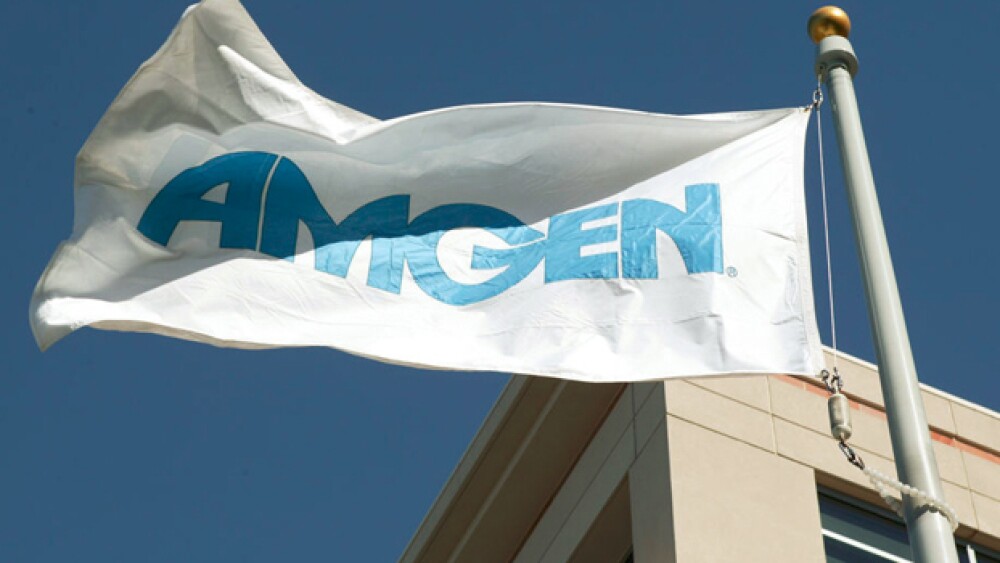The agency approved Evenity on the basis of two Phase III clinical trials. The drug had been rejected in 2017 over safety concerns.
The U.S. Food and Drug Administration (FDA) greenlighted Amgen and UCB’s Evenity (romosozumab-aqqg) for osteoporosis in postmenopausal women at high risk for fracture. The drug had been rejected in 2017 over safety concerns.
The agency approved Evenity on the basis of two Phase III clinical trials. In the FRAME trial, treatment with Evenity showed a significant decrease in new spine fracture at 12 months compared to placebo. The reduction in fracture risk remained through the second year in women who received the drug during the first year and transitioned to denosumab compared to those who transitioned from placebo to denosumab. Evenity also resulted in significantly increased bone mineral density (BMD) at the lumbar spine, total hip and femoral neck compared to patients receiving placebo at one year. And like the fracture risk, BMD remained through 24 months even when patients transitioned to denosumab.
In the ARCH study, patients received Evenity for a year followed by 12 months of alendronate. This significantly decreased the incidence of new spinal fracture at 24 months and also significantly reduced the risk of clinical fracture after a median follow-up of 33 months. The drug increased BMD at the lumbar spine, total hip and femoral neck at 12 months compared to alendronate. In addition, a year of Evenity followed by a year of alendronate significantly increased BMD compared to alendronate by itself.
Denosumab is Amgen’s Prolia, which is prescribed for osteoporosis in women after menopause who are at high risk for fractures or who can’t use another osteoporosis medicine, or the other drugs did not work well. It is intended for chronic treatment, while Evenity is intended for short-term use. Evenity quickly increased bone mineral density and decreases fracture risk, while Prolia increases bone mass while the patient is taking it.
Evenity works by inhibiting a protein called sclerostin. Sclerostin stops bone production and increases its breakdown. The current standard of care for osteoporosis is a group of drugs known as bisphosphonates, such as alendronate, which was originally marketed as Merck’s Fosamax. Bisphosphonates inhibit osteoclasts, which break down bone tissue, but they don’t rebuild bone.
There was also a BRIDGE clinical trial that evaluated the drug in men with osteoporosis. All of the clinical trials showed the monoclonal antibody worked, but there were serious cardiovascular adverse events in the ARCH trial. As a result, the FDA issued a complete response letter in July 2017.
In 2018, Amgen and UCB, based in Belgium, resubmitted the application but in a narrower patient population. An advisory committee for the FDA met in January and mostly supported the drug despite the cardiovascular problems. The drug comes with a Boxed Warning that the drug may increase the risk of heart attack, stroke and cardiovascular death. And it shouldn’t be used in patients who have had a heart attack or stroke within the previous year.
However, women who have had a fracture related to osteoporosis are at significant risk for another one within one to two years. Elizabeth Thompson, chief executive officer of the National Osteoporosis Foundation, stated, “Osteoporosis is a serious disease that is underdiagnosed and often goes untreated. In fact, approximately 80 percent of patients who have had one or more osteoporotic-related fractures are not being identified or treated. This approval is great news for patients and physicians because it gives them another much needed treatment option to help reduce the risk of life changing fractures.”
Jefferies analyst Michael Yee projects Evenity as likely to bring in more than $500 million globally and points out that Eli Lilly’s osteoporosis treatment Forteo has a black box warning about increased cancer risk but brought in more than $1.5 billion in the last two years.
“Although Evenity showed greater bone mineral density improvements than Forteo, we believe the black box warning for CV risk will limit uptake to the highest-risk patients with multiple prior fractures,” Do Kim, an analyst with BMO Capital Markets, wrote in a note to clients. “Both Forteo and Tymlos require daily dosing, compared to Evenity’s once-monthly. We could see preference for Evenity in patients without prior CV events, given less frequent dosing and assuming a lower price.”
Tymlos (abaloparatide) is Radius’ osteoporosis drug.





